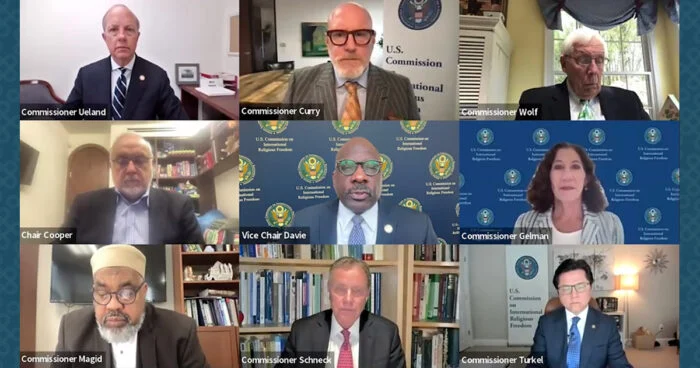But if the demands for a boycott haven’t changed since 2008, China — and its relationship with the world — have.
Twelve years after the Communist Party weathered criticism to hold a lavish, and ultimately successful, coming-out party on the world stage, a more powerful and globally influential Chinese government is squaring off against a more united and skeptical bloc of critics, particularly in the West.
A mass boycott of the Winter Games does not appear imminent. But widespread human rights concerns — accentuated by geopolitical rivalries — suggest the 14 months leading up to the Feb. 4, 2022, opening ceremony will be particularly fraught.
Calls to cancel
Last month, more than 160 human rights groups asked the International Olympic Committee to move the Winter Games. Other demands to scrap the Beijing Olympiad have come from leaders of a newly formed multinational coalition of lawmakers called the Inter-Parliamentary Alliance on China, which includes Sens. Robert Menendez (D-N.J.) and Marco Rubio (R-Fla.), Iain Duncan Smith, a member of the British Parliament, and legislators from the European Union, Japan, Australia and other countries.
In March, 12 senators led by Rick Scott (R-Fla.) submitted a bipartisan resolution asking the International Olympic Committee to rebid the Games.
On Wednesday, British Foreign Secretary Dominic Raab made headlines in Britain when he said he needed to gather more evidence on whether Chinese actions in Xinjiang amounted to genocide and would not rule out a boycott.
“Generally speaking, my instinct is to separate sport from diplomacy and politics, but there comes a point when it is not possible,” Raab said. He was speaking to reporters shortly after 39 countries, led by Germany, condemned China’s crackdown in Xinjiang and Hong Kong at the United Nations.
Reinhard Bütikofer, a member of the European Parliament from Germany and part of the Inter-Parliamentary Alliance on China, said legislators from the alliance this summer organized news conferences, rallies and hearings at every stop of Chinese Foreign Minister Wang Yi’s European tour to counter the Chinese official’s talking points, and might organize again around the Olympics.
In 2008, Bütikofer said, Olympic organizers promised that China would improve its rights record as part of the agreement to hold the Games. In the decade since, China has moved in a “totally opposite” direction, he said.
“When you look at how the IOC justified the 2008 Olympics in Beijing, you really wonder how they could sustain the decision on 2022,” Bütikofer said. “Some of us will make the public remember that.”
A Western-led boycott in 2022 would hark back to the final decade of the Cold War, when the United States and its allies walked out of the 1980 Summer Games to protest the Soviet Union’s invasion of Afghanistan. Communist countries retaliated by skipping the 1984 Games in Los Angeles.
China’s critics have reached further back in history to argue against the 2022 Games.
Since 2008, human rights activists have warned that China hosting the Olympic Games would be compared in hindsight to the 1936 Olympics in Berlin, which Hitler used to burnish Nazi Germany’s image as a rejuvenated industrial and military power.
Those comparisons are resurfacing with resonance at a moment when several governments, including the Trump administration, are weighing whether to designate the Chinese repression of the mostly-Muslim Uighurs as genocide.
Sophie Richardson, the China director at Human Rights Watch, said the Chinese government enjoyed the world’s “benefit of the doubt” in the 2000s, as it was seen as embarking on a fitful journey toward liberalization after its 2001 entry into the World Trade Organization.
In the run-up to 2008, Chinese officials also pledged to make certain concessions, such as letting foreign journalists report freely and allowing petitioners to openly protest in a designated zone in Beijing.
‘Radically different’
But in the years since, politics in China tightened sharply after the ascent of President Xi Jinping in 2013. Across the developed world, public opinion of China reached a record low this year, a stark reversal of the favorable or mixed views of the 2000s, according to a study released this week by the Pew Research Center.
“That willingness to give the benefit of the doubt has evaporated,” Richardson said. “Look at Hong Kong or Xinjiang now versus in 2008 or even two years ago. The order of magnitude of violations is radically different and far more disturbing.”
At the same time, the current Chinese leadership is less amenable to making concessions and more influential in the international arena, including at the United Nations. Last year, China secured support from 50 ambassadors, mostly from developing countries wary of the West and buttressed by Chinese economic ties, to extol its Xinjiang policy not as an infringement on human rights, but a boon to social stability.
Last month, Chinese Foreign Ministry spokesman Wang Wenbin dismissed criticism of China’s qualifications to host the Games by pointing out the support it has drummed up from countries including Russia, Iran, Saudi Arabia and Egypt.
“By linking the so-called human rights issue with the Winter Olympics in an attempt to pressure China, certain organizations have made the mistake of politicizing sporting events,” Wang said. “That goes against the spirit of the Olympic charter and disrupts and jeopardizes the progress of the global human rights cause.”
Officials at the International Olympic Committee, already under pressure from the Tokyo Games that have been delayed by the coronavirus pandemic, have also criticized boycott calls as generally unproductive. IOC President Thomas Bach told reporters in July that he was “fully confident” China would deliver on its “commitment” to respecting human rights.
“Boycotts and discrimination because of political background or nationality are once again a real danger,” Bach said. “A sporting boycott only punishes the athletes of the boycotting country and deprives their people of sharing in the success, pride and joy of their Olympic team.”
The hashtag “Boycott Winter Olympics” in China’s social media network Weibo has been completely censored. But a few essays in the WeChat ecosystem, analyzing the political context of past boycotts and lamenting the mounting controversy over the 2022 games, have cropped up in the past week.
‘Anti-globalization is the trend’
In a post entitled “American imperialists are trying another harmful trick,” the nationalist world affairs blog Telling International Jokes noted how the Olympics went from a showcase for China in 2008 to a cudgel in a “New Cold War” in 2020.
The 2008 Games “let the world know about the all-new China and how China could make the world a better place. Globalization was the biggest theme in the world in 2008,” wrote the author. “Fast forward to 2020, and anti-globalization is the trend. Political and economic friction between China and the West has only worsened. The ‘New Cold War’ has only intensified.”
Nicholas Sarantakes, a professor at the U.S. Naval War College who has studied Olympic boycotts and the author of “Dropping the Torch: Jimmy Carter, the Olympic Boycott, and the Cold War,” said the Olympics have long been intensely politicized. Nearly half of the Games in history have been subject to some kind of political action, said Sarantakes, who cautioned against a boycott.
“Sending the IOC to Beijing is politically tone deaf, but the reality is the IOC is boxed in a corner,” he said, adding that it would be highly unlikely for Olympic organizers to move the event, which was given to Beijing over Almaty, Kazakhstan, after other contenders dropped out six years ago.
So what is likely? “I have every expectation that criticisms and political posturing will increase and not stop until the Olympics are over,” Sarantakes said.






